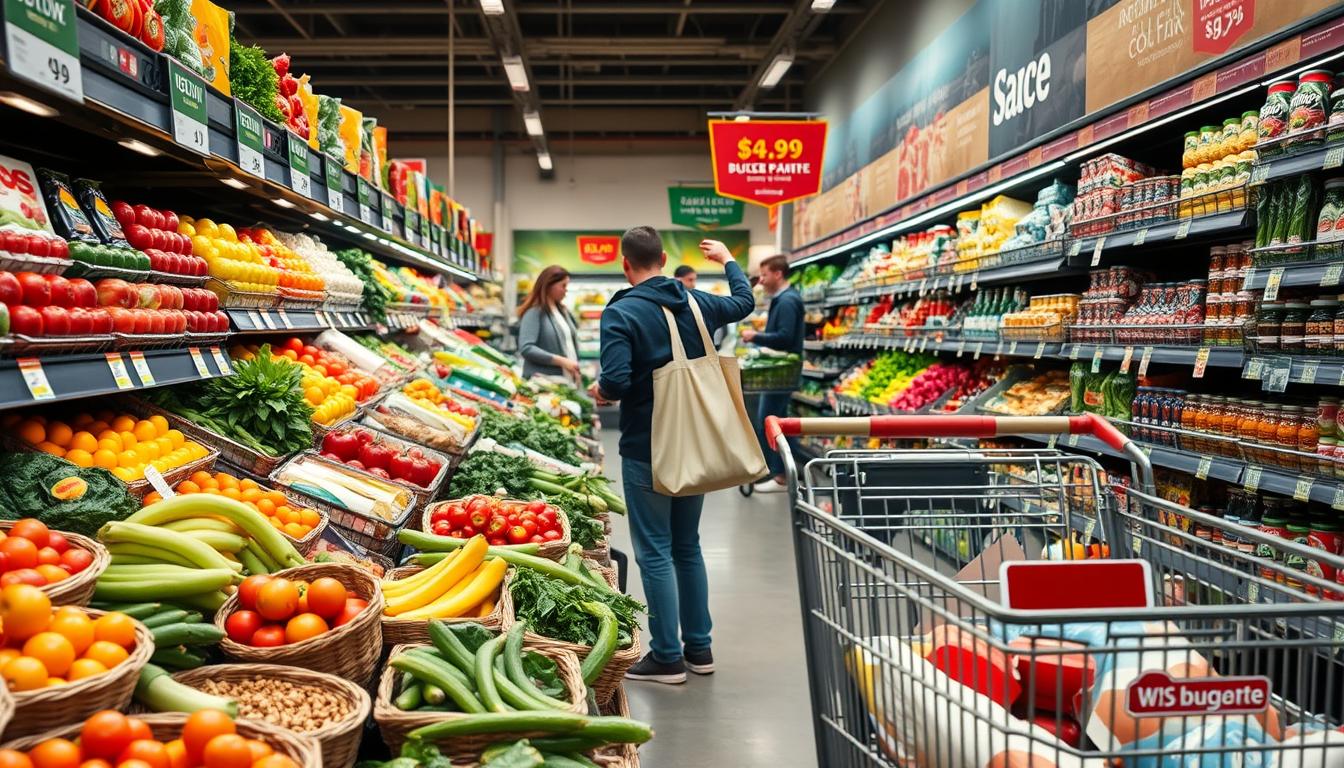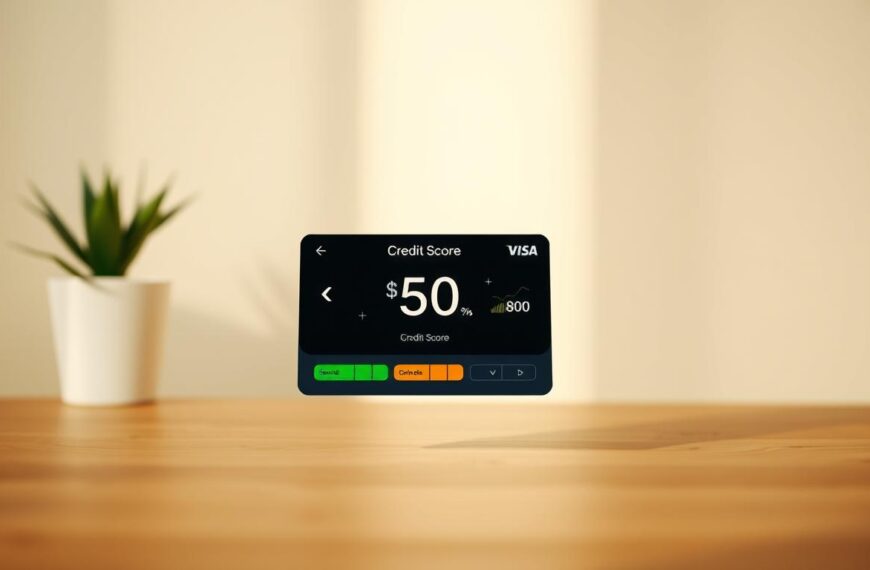Budget-friendly grocery shopping can be tricky for many UK households. Families are looking for ways to save money on food without sacrificing nutrition1.
Supermarkets use clever tactics to encourage spending. Many families find it hard to track food expenses. This affects their shopping efficiency1.
Knowing these tactics can help you make smarter choices. Snack foods often cost more than meal ingredients. This can increase your overall food costs1.
Savvy shoppers use strategies like bulk buying and meal planning. These methods can greatly reduce grocery bills1.
Cooking from scratch is a brilliant way to cut costs. Home-cooked meals can slash food expenses by about 75%1.
Talking with your family about meal choices and budgeting helps. It can improve your financial management1.
Let’s explore practical ways to improve your grocery shopping. You’ll learn how to shop on a budget and avoid unnecessary spending.
Understanding Supermarket Psychology and Shopping Strategies
Supermarkets use clever tactics to influence your shopping habits. They design store layouts to boost spending and trigger impulse buys2. People make over 200 food choices daily, so smart shopping is key for budget-savvy folks2.
How Supermarkets Manipulate Shopper Behaviour
Shops use psychology to make you spend more. Fresh produce at the entrance primes you for later impulse purchases3. The longer you shop, the more likely you’ll make emotional buying choices3:
- After 23 minutes, impulse buying increases dramatically
- By 40 minutes, rational thinking diminishes
Strategic Shopping List Tips
A solid shopping list helps fight these sneaky tactics. UK shoppers visit supermarkets 221 times a year on average4. This makes smart shopping habits crucial.
| Shopping Strategy | Impact |
|---|---|
| Creating a Detailed List | Reduces impulse purchases by 40% |
| Shopping with a Full Stomach | Decreases unnecessary spending |
| Avoiding Peak Hours | Minimises emotional buying triggers |
Best Times and Store Selection
Store layout greatly affects your spending habits. End-of-aisle displays can sell up to eight times better than regular shelf items3. Knowing these tricks helps you make smarter choices and save money.
“Awareness is the first step in defeating supermarket psychological tricks” – Shopping Psychology Expert
Food Shopping on a Budget Tips: The Downshift Challenge
The Downshift Challenge helps shoppers cut grocery bills while maintaining quality. By exploring cheaper brands, consumers can save up to £1,000 yearly5. This strategy focuses on smart shopping techniques for significant savings.
Supermarkets offer four main product tiers: Premium, Branded, Own Brand, and Value6. Taste tests often show cheaper alternatives match or outperform pricier options6. This reveals surprising insights about product quality across different brand levels.
Key Strategies for the Downshift Challenge:
- Start with non-critical items like store-cupboard staples
- Conduct blind taste tests at home to compare products
- Be open to trying lower-priced alternatives
Downshifting can lead to a 30% reduction in grocery bills5. For a family spending £100 weekly, this could save £1,500 annually6. These savings are substantial and can make a real difference.
“Not all expensive products are superior, and not all budget options are inferior.”
Some practical tips for successful brand downshifting include:
- Compare ingredient lists between branded and budget options
- Read product reviews and consumer feedback
- Gradually introduce lower-priced alternatives
Retailers like Asda, Sainsbury’s, and Morrisons have created their own value ranges7. Some brands produce items for multiple supermarkets, resulting in identical quality despite different packaging7.
The Downshift Challenge aims to find genuine value in your grocery shopping6. It’s not just about saving money, but making smarter choices for your budget.
Smart Ways to Maximise Savings with Loyalty Schemes and Discounts
Reducing grocery costs requires clever planning and smart use of resources. Digital tech offers many ways to save through loyalty programmes and discount strategies.
Budget shopping has become easier with the right approach. Loyalty programmes and digital coupons are powerful tools for cost-conscious shoppers.

Maximising Supermarket Loyalty Cards
Loyalty cards are a brilliant way to cut shopping costs. Members earn points for discounts, with some schemes offering big savings8.
To get the most out of loyalty cards, understand each supermarket’s scheme. Track your points carefully and know the redemption rules.
- Compare different loyalty card offerings
- Track point accumulation carefully
- Understand redemption rules
Digital Coupon Strategies
Digital coupons have changed budget shopping for the better. Apps like CheckoutSmart and Shopmium offer cashback that can slash grocery bills8.
Use these digital tools wisely to save a lot on your shopping. They can make a big difference to your grocery spend.
| App Name | Key Features | Potential Savings |
|---|---|---|
| CheckoutSmart | Instant cashback | Up to 100% on selected items |
| Shopmium | Personalised offers | Substantial grocery discounts |
Strategic Reduced Item Shopping
Reduced item shopping is a great way to stretch your grocery budget. Timing is key for the best discounts.
Try shopping on Friday nights or weekday afternoons between 2pm and 6pm. Some shoppers find items for under 50p during these times8.
“Smart shopping isn’t about spending less, it’s about spending wisely.” – Budget Shopping Expert
Mix loyalty programmes, digital coupons, and reduced item shopping to cut grocery costs9. Consistent planning is the key to success.
Practical Storage Solutions and Waste Reduction
UK households face a critical challenge in reducing food waste. This issue has significant environmental and financial impacts. Nearly a third of food produced for humans ends up wasted10.
Proper food storage can help families save money and reduce their ecological footprint. Effective meal planning is key to cutting down on waste. Experts suggest planning meals for 5-6 days weekly10.
Smart kitchen organisation can greatly reduce unnecessary food disposal. By using these strategies, you can make a real difference in your household.
- Store herbs like a bouquet of flowers to extend their freshness for up to 10 days
- Keep onions and potatoes separate to optimise their storage conditions
- Use a 1:3 vinegar-water solution to keep berries mould-free for a week
New technologies are helping to fight food waste. Apps like Oddbox and Too Good To Go redistribute surplus food10. These apps create cost savings for consumers while reducing waste.
| Storage Technique | Benefit |
|---|---|
| Freezing portions | Preserve nutritional value and reduce waste |
| Using high/low humidity drawers | Extend produce shelf life |
| Checking ‘yellow label’ items | Save money on nearly expired produce |
Pro tip: Households can save about £470 yearly by preventing food waste10. Being mindful of consumption habits is key to achieving this saving.
Conclusion
Budget shopping mastery requires a strategic approach. Small changes can significantly impact your grocery spending11. Meal planning, list-making, and mindful purchasing habits can slash unnecessary costs12.
Key strategies include choosing store-brand products and timing your shopping trips wisely13. Exploring farmers’ markets can also yield savings. Buying seasonal produce and using cashback apps can further reduce monthly food expenses11.
Developing budget shopping skills takes time. Start with one or two strategies and track your savings. Successful shoppers stay flexible, always learning and adapting their methods12.
Your path to smarter food shopping begins now. Every pound saved improves financial management. Stay patient and watch your grocery savings grow.
FAQ
How can I reduce my grocery shopping expenses?
Create a detailed shopping list and plan meals in advance. Compare prices across supermarkets and use loyalty cards. Try the Downshift Challenge to find cheaper alternative brands.
Use digital coupons and avoid shopping when hungry. Stick to your planned list to prevent impulse purchases.
What are the best times to go grocery shopping?
Shop early mornings on weekdays or late evenings. Stores often mark down perishable items during these times. Avoid peak hours like weekends and after work.
Many supermarkets reduce prices on fresh produce and meat towards the end of the day. This helps them clear stock quickly.
How can I save money without compromising on food quality?
Try the Downshift Challenge by replacing branded products with cheaper alternatives. Conduct blind taste tests to find similar quality products at lower prices.
Focus on store brands and value ranges. Be selective about where you spend more – some products are worth the extra cost.
How do loyalty programmes actually help me save money?
Supermarket loyalty programmes offer personalised discounts, points accumulation, and exclusive offers. They provide targeted deals based on your shopping habits.
Register for these programmes and check available offers before shopping. This can help you save money on products you regularly purchase.
What are the most effective ways to reduce food waste?
Plan meals, store food correctly, and use leftovers creatively. Buy only what you need and invest in good storage containers.
Understand food preservation techniques and create meals using multiple ingredients. Freeze excess food and do regular fridge and pantry audits to prevent spoilage.
How can I make the most of digital coupons?
Download supermarket apps and sign up for email newsletters. Use coupon websites to find digital discounts. Compare offers across different platforms.
Combine coupons with loyalty programme offers. Plan your shopping around these digital savings. Avoid buying unnecessary items just because they’re discounted.
Are own-brand products really as good as branded items?
Many own-brand products are made to similar standards as branded items. Conduct blind taste tests to compare quality and price.
Store-brand products are often cheaper but comparable in quality. Staple ingredients and basic condiments are excellent candidates for cheaper alternatives.
How can I stick to my grocery budget?
Create a realistic budget and plan meals in advance. Use a calculator while shopping and bring only the cash you intend to spend.
Avoid shopping when hungry and use cash-back apps or loyalty programmes. Track your expenses to understand spending patterns and identify areas for improvement.

















